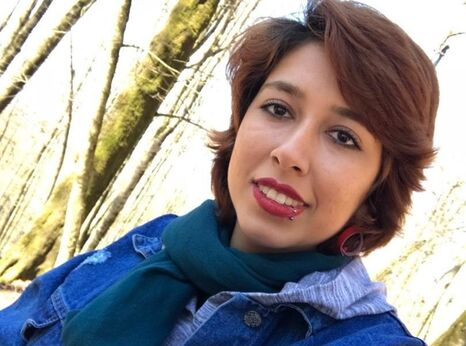Young activist given 24-year jail sentence

Saba Kordafshari was sentenced to 24 years in prison by Branch 26 of the Revolutionary Court of Tehran in August 2019 for her peaceful human rights work in a grossly unfair trial. The 24-year sentence consisted of 15 years for “inciting and facilitating corruption and prostitution” through promoting “unveiling”, seven and a half years for “gathering and colluding to commit crimes against national security” and one and a half years for “spreading propaganda against the system”.
In November 2019, Saba Kordafshari’s lawyer was formally notified that Branch 36 of Court of Appeals in Tehran had acquitted her of “inciting and facilitating corruption and prostitution” through promoting “unveiling” and, therefore, reduced her prison sentence from 24 years to nine years, of which she needed to serve seven and-a-half years in prison under Iran’s sentencing guidelines. At that time, her lawyer was permitted to review the appeal court’s written judgement but was not provided with a copy. It was then that the lawyer read that her conviction for “inciting and facilitating corruption and prostitution” through promoting “unveiling” had been overturned and her prison sentenced reduced. In March 2020, Saba Kordafshari was also allowed to read the November 2019 appeal court verdict, but was denied her request for a copy. The authorities’ refusal to provide her and her lawyer with a copy of the verdict follows from Note 2 to Article 380 of Iran’s Code of Criminal Procedure, which allows the authorities to refrain from providing defendants and their lawyers with a written copy of the judgement in cases involving offences against “decency” or “national security”. This practice violates Iran’s obligation to ensure that judgements rendered in criminal cases are made public (with certain exceptions not relevant to this case), as provided in Article 14(1) of the International Covenant on Civil and Political Rights, to which Iran is a state party.
On 26 May 2020, Saba Kordafshari received a letter from the Office for the Implementation of Sentences listing her convictions and the number of prison years imposed for each charge, and she found, to her shock, that the document included the charge of “inciting and facilitating corruption and prostitution” through promoting “unveiling”. She subsequently learned that the judicial authorities had unlawfully and secretly altered the November 2019 verdict of the Branch 36 of Court of Appeals and made it appear that the appeals court had upheld her original conviction and sentence in full. After her lawyer learned through Saba Kordafshari of what had happened, he filed a complaint and was told by prosecution authorities that since not all the appeals court judges had signed the November 2019 verdict, the alteration of the verdict holding was “not a violation”. Saba Kordafshari understands that it has happened with the complicity of the judges in Branch 36 of Court of Appeals in Tehran, who were reportedly aware of the alteration to the verdict.
After her arrest, Saba Kordafshari was held in solitary confinement for 11 days in Vozara detention centre in Tehran, where she was interrogated about her human rights work before transferred on 11 June 2019 to Shahr-e Rey prison, in Varamin, outside of Tehran. On 2 July 2019, the Revolutionary Guards transferred her to another location and concealed her fate and whereabouts from her family until 13 July 2019, thus subjecting her to enforced disappearance for those 12 days. On 13 August 2019, she was transferred to the women’s ward of Evin prison.
Women’s rights defender Raheleh Ahmadi, Saba Kordafshari’s mother, is also unjustly jailed in Evin prison, where she began serving a 31-month prison term on 20 February 2020 following her conviction of "gathering and colluding to commit crimes against national security" and "spreading propaganda against the system". Amnesty International believes she is a solely detained for her peaceful campaigning against compulsory veiling and for her public campaigning on behalf of her unjustly imprisoned daughter.
Following the period of solitary confinement and interrogations, Saba Kordafshari began to pass bloody stools and experiencing pain. She asked to be referred to the hospital for further examination and tests. The prison medical clinic eventually tested her blood and her stool and said she was anaemic due to blood loss. Saba Kordafshari waited for one year before being transferred to hospital, and with the cost covered by her family. Amnesty International has documented a pattern of prisoners held for politically motivated offenses being denied timely specialized medical care outside prison. Moreover, requiring prisoners to pay for medical care violates Iranian law and is inconsistent with international standards See Healthcare taken hostage: cruel denial of medical care in Iran’s prisons for further information.